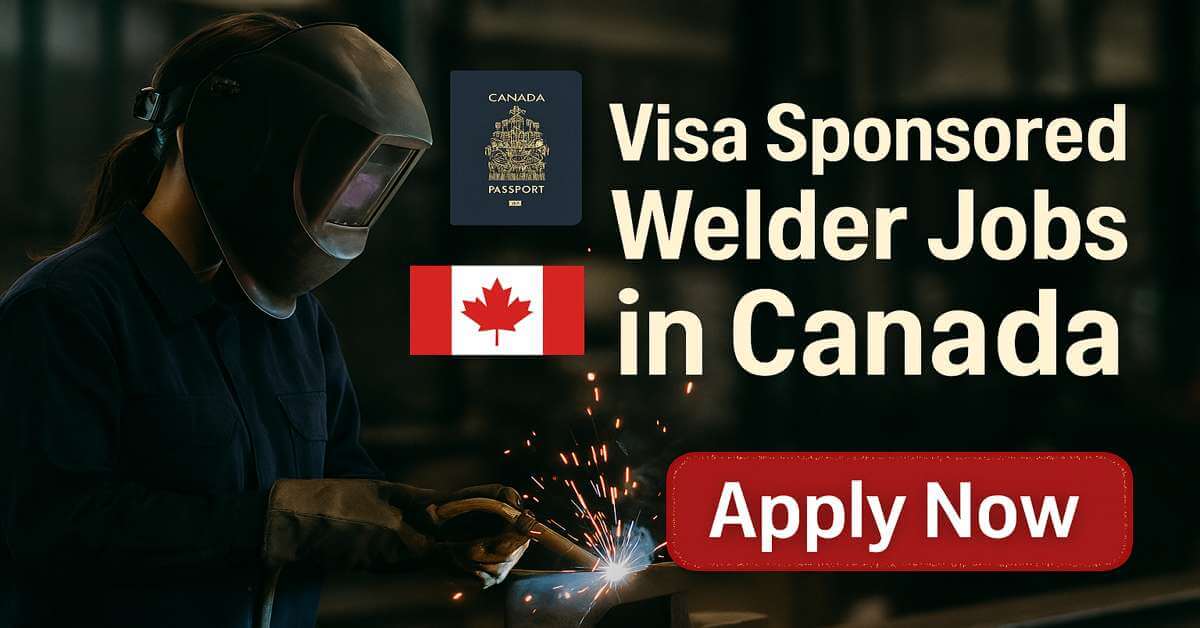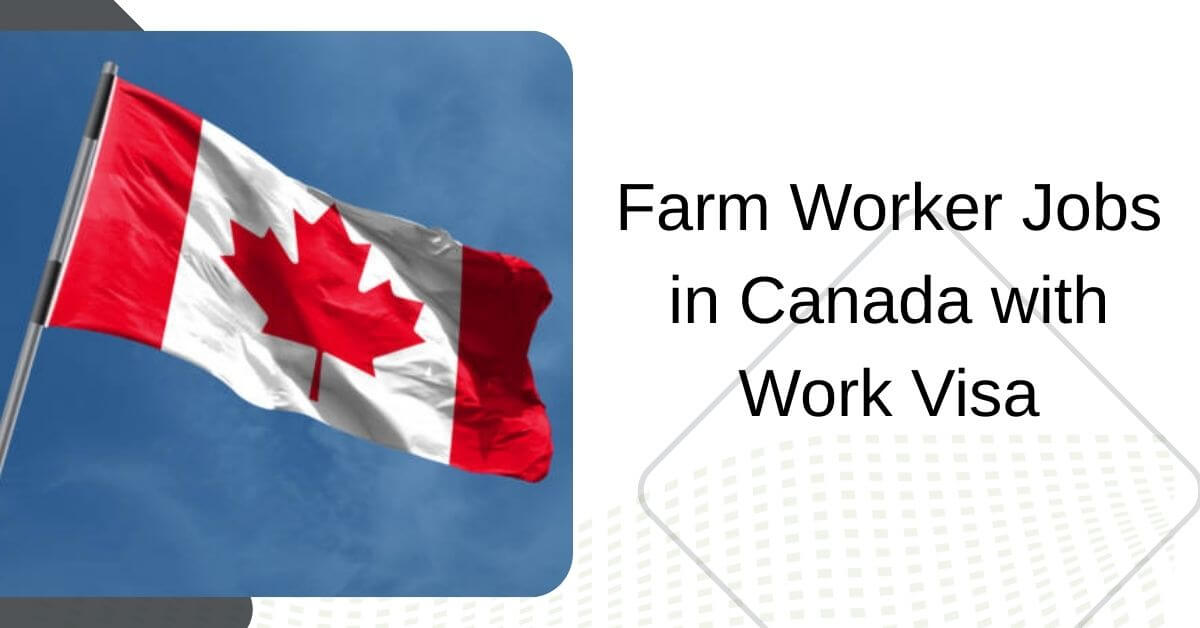If you’re looking for a rewarding career, Visa Sponsored Welder Jobs in Canada offer salaries ranging from CAD 25 to 45 per hour with opportunities to gain hands-on experience in 1 to 2 years. These positions are full-time and primarily on-site, allowing you to work physically with advanced welding equipment while building a stable future in 2026.
Moving to a new country for work can feel overwhelming, but these jobs provide a structured pathway with visa support, making your dream of working abroad achievable.
Job Details:
- Country: Canada
- Job Title: Welder
- Education: Not mandatory, but certifications preferred
- Experience: 1-2 years minimum
- Visa Sponsorship: Yes, available for qualified candidates
- Who Can Apply: All nationalities
Types of Welder Jobs in Canada:
Welders are in demand across a variety of industries in Canada, including:
- Manufacturing & Industrial Welding: Fabrication of metal parts for machinery, shipbuilding, and infrastructure projects.
- Structural Welding: Building bridges, high-rise buildings, and other large structures requiring heavy steel work.
- Automotive Industry: Welding vehicle components and assemblies.
- Artistic Welding: Creating metal artwork, sculptures, and decorative designs.
- Robotics and Automation Welding: Working with automated welding systems integrating robotics and advanced technologies.
Required Skills and Qualifications:
To work effectively as a welder in Canada, you should have:
- Experience using different welding techniques such as TIG, MIG, SMAW (stick welding), and oxy-fuel welding.
- Ability to read and interpret blueprints and technical drawings.
- Knowledge of metallurgy and welding safety standards.
- Proficiency with manual and mechanical welding equipment.
- Good communication skills in English or French.
- Completion of a recognized welding apprenticeship or certification program (e.g., Red Seal Certification is highly valued).
- Strong attention to detail and physical stamina to perform demanding tasks.
Responsibilities of Welder Jobs in Canada:
Typical welder duties include:
- Reviewing blueprints and project specifications before starting work.
- Measuring, cutting, and preparing metal parts for welding.
- Selecting the correct welding equipment and settings based on project requirements.
- Performing welding tasks in various positions such as flat, vertical, and overhead.
- Inspecting welds for quality and ensuring compliance with safety standards.
- Maintaining welding equipment and keeping the work area safe and clean.
- Repairing and reinforcing existing metal structures or machinery.
Read Also: Truck driving Jobs in Canada for Foreigners with Sponsorship
Benefits of Welder Jobs in Canada:
- Competitive Salary Packages:
- Welders in Canada typically earn between CAD 25 to 45 per hour, depending on experience, location, and industry. This competitive pay allows for a comfortable lifestyle and financial stability. Many employers also offer overtime pay and bonuses.
- Comprehensive Visa Sponsorship:
- Employers provide full support for work visa applications, including documentation and guidance through the immigration process, making it easier for international welders to relocate and work legally in Canada.
- Pathway to Permanent Residency and Citizenship:
- Many visa sponsorship programs link to Canada’s immigration pathways such as the Express Entry system and Provincial Nominee Programs. This allows skilled welders to apply for permanent residency and eventually citizenship, offering long-term stability.
- Strong Job Security and Industry Demand:
- Welding is a highly sought-after skill across various sectors such as construction, manufacturing, oil and gas, and automotive industries. Skilled welders enjoy steady demand, reducing the risk of unemployment.
- Access to High Quality Healthcare and Social Services:
- Canada is renowned for its universal healthcare system and robust social services, which visa-sponsored workers and their families can access.
- Safe and Regulated Work Environments:
- Canadian workplaces adhere to strict health and safety regulations to protect workers. Welders benefit from enforced safety standards, proper equipment, and training to minimize risks.
- Opportunities for Professional Growth:
- Employers often provide training programs and encourage welders to obtain Canadian certifications, helping workers stay current with evolving technologies and advance their careers.
- Diverse and Inclusive Workplaces:
- Canada’s multicultural society means welders can work alongside people from various cultural backgrounds, fostering inclusive and respectful workplaces.
- Family Sponsorship Options:
- Skilled workers on visa sponsorship can often sponsor their spouses and dependent children to join them in Canada, ensuring family unity.
- Work-Life Balance:
- Canadian labor laws support reasonable working hours, paid vacation, sick leave, and other benefits that promote a healthy work-life balance and overall well-being.
Salary Expectations:
The average wage for welders in Canada varies depending on experience, location, and employer:
- Entry-level welders typically earn between CAD 25 and 30 per hour.
- Experienced welders can earn CAD 30 to 45 per hour, particularly in high-demand provinces like Alberta and British Columbia.
- Additional benefits may include health insurance, retirement plans, and paid leave.
How to Apply for Visa Sponsored Welder Jobs in Canada?
- Prepare Your Documents:
- Update your resume to Canadian standards highlighting your welding experience and certifications.
- Obtain copies of your welding certifications (e.g., Red Seal).
- Gather references from previous employers.
- Search for Jobs:
- Use trusted job sites like Job Bank Canada, Indeed, or company websites to find visa-sponsored welder positions.
- Focus on employers who are registered visa sponsors.
- Submit Applications:
- Apply online with a tailored cover letter explaining your willingness to relocate and your visa needs.
- Interview:
- Be prepared for technical questions about welding techniques and workplace safety.
- Some employers may request a practical welding test.
- Obtain Job Offer & Sponsorship:
- Once hired, your employer will provide a Certificate of Sponsorship for your visa application.
- Apply for Work Visa:
- Apply for a Skilled Worker Visa through the official Government of Canada website.
- Travel & Begin Work:
- After visa approval, relocate and start your new job in Canada.
Conclusion:
Welder Jobs in Canada with Visa Sponsorship offer competitive pay, hands-on experience, and full support for international workers. Skilled welders can enjoy career growth, safe work environments, and pathways to permanent residency. These opportunities provide a stable, rewarding future while living and working in a welcoming country.
Frequently Asked Questions:
-
Are there opportunities for permanent residency?
Yes. Many visa-sponsored welders can apply for permanent residency in Canada through programs such as Express Entry or Provincial Nominee Programs after gaining work experience.
-
Can welders from any country apply for visa sponsorship jobs in Canada?
Yes, welders from all nationalities can apply, as long as they meet the job requirements and visa eligibility criteria.
-
Do I need specific welding certifications to work in Canada?
While formal certifications like the Red Seal Welding Certification are highly recommended and valued by employers, some entry-level positions may accept equivalent experience and training. Having recognized certifications improves your chances significantly.






